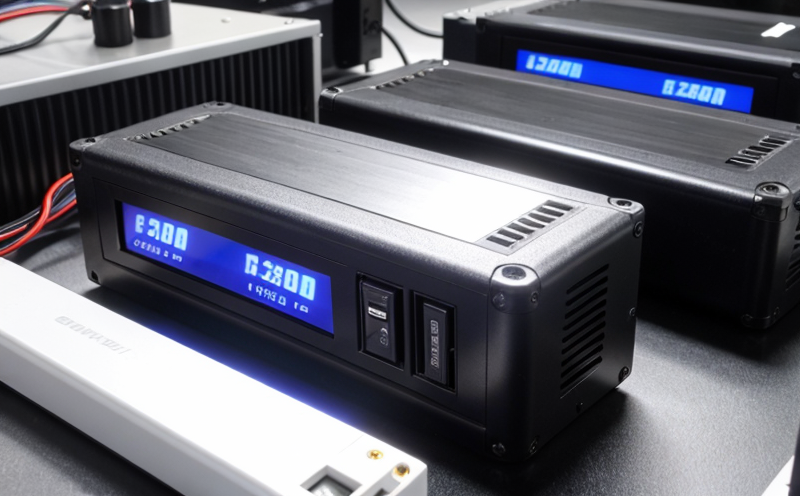IEC 62620 Large Format Secondary Lithium Cell Performance Testing
The IEC 62620 standard is specifically designed to ensure the safety, performance, and durability of large format secondary lithium cells used in a variety of applications. This service focuses on testing these cells according to IEC 62620, which covers the essential requirements for electrically operated mobile machinery with rechargeable batteries.
The scope of this test is broad, encompassing various aspects such as electrical characteristics, mechanical performance, safety features, and environmental stress tests. This ensures that large format secondary lithium cells meet stringent international standards and are reliable for use in demanding applications.
Our testing facility uses state-of-the-art equipment to simulate real-world conditions under which these batteries operate. From high-temperature cycling to low-temperature retention, we ensure that the cell performs consistently across all defined parameters.
The testing process involves several key steps:
- Initial Inspection: Before any tests begin, each cell undergoes a thorough inspection for defects and inconsistencies.
- Electrical Characteristics Testing: This includes measuring the nominal voltage, internal resistance, capacity, and energy content of the cell.
- Mechanical Performance Evaluation: Cells are subjected to various mechanical stresses to assess their robustness and ability to withstand physical abuse without failure.
- Safety Feature Assessment: Compliance with safety features such as overcurrent protection, thermal management systems, and pressure relief valves is rigorously checked.
- Environmental Stress Testing: Cells are tested under extreme environmental conditions like high temperatures (up to 60°C) and low temperatures (down to -25°C).
The results of these tests provide comprehensive insights into the cell's performance, helping manufacturers ensure quality and reliability. Our laboratory adheres strictly to IEC 62620 guidelines, ensuring accurate and reliable test outcomes.
By partnering with our laboratory for IEC 62620 testing, you can be confident that your large format secondary lithium cells meet the highest international standards. This not only enhances your product's reputation but also ensures it is safe and dependable in various applications.
Scope and Methodology
The scope of IEC 62620 testing includes a wide range of performance metrics critical for large format secondary lithium cells. Our methodology follows the standard meticulously to ensure consistency and accuracy in test results.
- Electrical Characteristics Testing: This involves detailed measurements of nominal voltage, internal resistance, capacity, and energy content.
- Mechanical Performance Evaluation: Cells are subjected to mechanical stresses such as vibration, drop testing, and compression tests.
- Thermal Management System Assessment: The performance of the thermal management system is evaluated under various temperature conditions.
- Safety Feature Compliance Check: Overcurrent protection, thermal management systems, and pressure relief valves are thoroughly assessed for compliance with IEC 62620 requirements.
- Environmental Stress Testing: Cells undergo tests in extreme environmental conditions including high temperatures (up to 60°C) and low temperatures (down to -25°C).
The methodology ensures that all aspects of the cell's performance are evaluated comprehensively, providing a detailed report for each parameter tested.
Our team of experts uses advanced instrumentation tailored to meet the stringent requirements set by IEC 62620. This includes specialized equipment for electrical testing, mechanical stress simulation, and environmental chamber systems capable of simulating real-world conditions.
The results from these tests are used to generate a detailed report, highlighting any areas where improvements can be made and ensuring compliance with all specified parameters.
Quality and Reliability Assurance
At our laboratory, we prioritize quality and reliability in every aspect of the testing process. Our team of experienced professionals ensures that each step adheres strictly to IEC 62620 guidelines, providing accurate and reliable test outcomes.
The initial inspection is crucial for identifying any defects or inconsistencies that could affect the cell's performance. This includes visual inspections as well as more detailed checks using specialized equipment.
Electrical characteristics testing is performed using high-precision instruments capable of measuring even slight variations in parameters such as voltage and internal resistance. These measurements are critical in determining the overall health and lifespan of the cell.
The mechanical performance evaluation involves simulating real-world conditions to assess the robustness of the cell. This includes drop tests, vibration tests, and compression tests designed to mimic potential abuse scenarios.
Thermal management system assessment is conducted under various temperature conditions to ensure that the cell can operate efficiently across a wide range of environments. The performance of the thermal management system is critical for maintaining optimal operating temperatures and preventing overheating or cold damage.
The safety feature compliance check ensures that all safety mechanisms are functioning correctly, providing protection against overcurrents, excessive heat, and other potential hazards.
Environmental stress testing simulates extreme environmental conditions to evaluate the cell's resilience. This includes tests in high temperatures (up to 60°C) and low temperatures (down to -25°C), ensuring that the cell can perform reliably in all expected operating environments.
The comprehensive nature of our testing process, combined with our strict adherence to IEC 62620 guidelines, ensures that every cell tested meets the highest standards of quality and reliability. Our laboratory's reputation for accuracy and reliability is built on these rigorous testing protocols.





